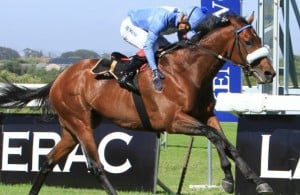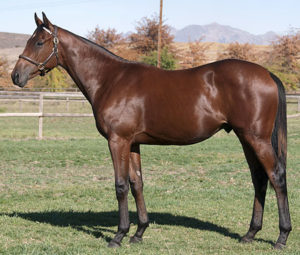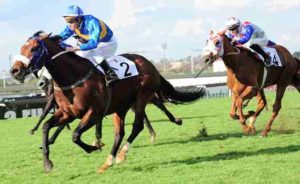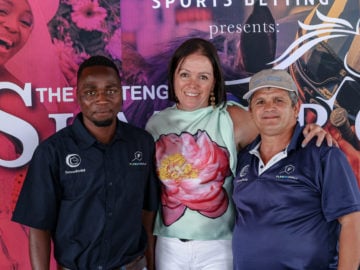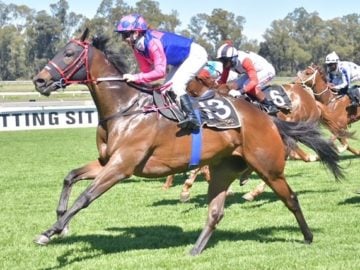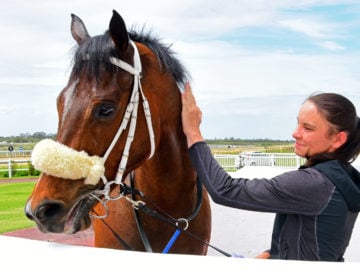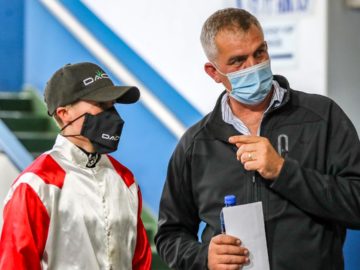When Vaughan Koster took over the helm at Cheveley Stud in 2008, he commented “My views on breeding are the same as Dad’s, so we are carrying on pretty much as before.” It seems the family recipe remains as successful as ever.
Vaughan Koster is the third generation of the Koster breeding dynasty, started by grandfather Ralph Koster on his Klavervlei stud in Beaufort West back in 1943. Ralph was a shrewd stockman. He carefully built a high quality broodmare band, mated them well and allowed the Karoo’s open spaces and bracing climate to do the rest. The recipe worked and produced the likes of Jerez, Majorca, Savonarola, Sword Dancer, Furious and Mazarin, to name but a few and Klavervlei’s reputation for producing tough, hardy horses soon rivalled the best in the country.
In 1980, Ralph’s youngest son Wilfred relocated to Ceres and along with his wife Shirley, established Cheveley Stud. It was developed slowly and judiciously and employing his father’s ethos and uncompromising standards for quality and toughness. Wilfred once commented “We don’t breed for the sales ring as such, but we try to utilise the good stallions, and our intention is to breed horses that are going to win the big races, so that people will want to buy our yearlings.” With horses such as Goldmark, Vesta, National Emblem, London News, Badger’s Drift, Angelina, Rabiya, Tiger Prawn and Argonaut coming thick and fast off their Ceres base, people did exactly that. Breeding under the combined banner of Koster Brothers with his brother John, ‘Koster Bros’ were champion breeders three years running (1988/1989 – 1990/1991) and again in 1995/1996.
Statesman
Vaughan remembers “Dad was incredibly principled and he brought us up in the same way. We learnt that you’ve got to be hard working and dedicated to a goal to achieve what you want from life. Dad was an incredibly hardworking man, probably borderline workaholic. There was not a moment when he wasn’t studying a pedigree or assessing how best to mate a mare. He spent hours doing his matings and I think that paid off in the long run – he knew his pedigrees backwards. I was very fortunate to be privy to that – even if only for a few years – and learnt a helluva lot from him in that respect.”
Despite this incredible legacy, Vaughan says horses weren’t always foremost on his mind. “I remember London News, National Emblem and Badger’s Drift well, but I was at school and at that stage of life where I wasn’t really sure what I wanted to do. One Saturday morning, I got home after rugby practice. I was tired and all I wanted to do was lie on the couch, relax and watch some tv. My parents sat me down and asked “Don’t you want to take an interest in the farm, isn’t it something that interests you?” I remember it like it was yesterday. But I still needed a bit of a nudge in the right direction. When I left school, I was awarded Agence Francaise’s Millennium Bursary and went to work for the Niarchos family in Normandy at Haras de Fresnay Le Buffard. That was the trigger that helped me decide that this is what I wanted to. And the rest is history, really. I worked at Coolmore for 8 months and then did a short stint at Weatherbys for 3 months. I had plans to go work in Australia and America, but then Dad fell ill and Mom phoned and said it’s time to come home.”
“It was the 2005 foaling season that I really kicked in and started working full-time on the farm. I was fortunate to work with Dad for two years to help me take over. Even though Dad didn’t get out on the farm much for the last year, I could at least still come and bounce ideas off him – that helped me tremendously in trying to set me up in taking the farm forward.” Wilfred passed away in 2008, a few months after Vaughan’s 27th birthday.
Confident
Vaughan has a confidence and composure that belies his years and he is also refreshingly honest and direct. “A lot of the time when a son follows in a successful father’s footsteps it doesn’t work out and there are critics asking whether I can do it. I have been very fortunate to inherit a farm like Cheveley with an incredible broodmare band and yes, it has been handed to me on a platter, but it still takes a lot of work to take it forward.” And take it forward he has. While there is something to be said for the old mantra ‘if it ain’t broke, don’t fix it,’ Vaughan has firm ideas on horses and how they should be raised and is not afraid to put his money where his mouth is – or to take it on the chin when things don’t go his way.
Breed ‘em tough
“The farm is over 1000ha of which 60ha is pasture, but we only keep the pastures for certain times of the year. We’ve got big dry camps of 10-15 ha and I love to get our weanlings into the open camps. We only bring them back onto the pastures just before yearling sale prep. We put a lot of value on our pastures and even with water being a scarce commodity it’s still the most cost effective way of feeding an animal and to me the most natural. I don’t enjoy a fat horse at all and we’re not big on feeding concentrates.”
“It’s become common knowledge at sales that our horses tend to be less conditioned than others and that’s important to me. I don’t want a horse peaking at sales time and dropping off afterwards. Horses that most people would consider being underdone, I think are perfect as they can continue on their growth curve. It gives me great satisfaction when someone who buys a horse from us comes back 2- 3 months down the line and says the horse has just flourished and grown into the most magnificent individual. That means I’ve done my job correctly and that the horse is continuing on an upward trend from when he was sold.”
When the first graduates of the new regime were offered at the 2012 Cape Premier Sale there were several comments that their draft was backwards and needed more time. Vaughan however, was philosophical and remained determined, remarking “Attitudes will not change overnight, and we are prepared for some negative impact in the short-term, but we are confident that we are producing a sounder, more robust individual. Obviously there has to be a balance between what looks good, what sells and what will run, but we are in the business of breeding a race horse, not a sales result. We are committed to taking a long-term view and will stick to it until the horses reach the track. The proof will be in the pudding.”
It hasn’t been a long wait. 2014 proved a landmark year for Cheveley Stud, receiving two simultaneous Horse of the Year titles – Legislate in South Africa and Equina in Zimbabwe.
The importance of family
While science and feeding is one part of the equation, successful breeding also comes from a little loyalty, a little luck and a little intuition. Vaughan explains, “Take Legislate’s female line as an example. Dad bought Classy Play in Natal from Alan Sutherland in foal to Bog Trotter. She was a tiny, tiny little mare and not much to look at, but out came this magnificent foal. He went on to become Black Skimmer, who won the Merchants. While it’s a Gr2 and a lovely race to win, it’s not what champions are made of, but it was just enough to give us a feeling. We’d had the family for many years and it was kind of knocking on the door, but not quite getting there. When you get a certain feeling about a family, you’ve got to back yourself and keep trying. So we kept five fillies from the family just on gut feel. We’re into the third generation now and eventually the reward came through Legislate. It just shows how one horse can make a huge difference to the family and to the farm because we kept so many.”
The Legislate story
“We have something of a personal bench mark for judging horses which is that if you look at foal at 10 days of age, then the general rule is that the individual is going to come back to that as a yearling. Legislate was the exception to that rule. He was born the most magnificent individual, but by the time of the National Sales, he was all over the place growth-wise. He didn’t look anything like he had as a foal. This lovely colt that I’d adored as a foal was now an angular, gangly, backward individual and I couldn’t make sense of it. Dynasty was doing quite well at the time, so when we went to the sale, even with his awkward growth stage, I thought we’d get at least R300k for him. However, people really didn’t like him. I wasn’t sure whether to put a reserve on him and asked a friend for advice who said ‘Forget about a reserve, just sell the bloody thing!’ In the end I put a reserve of R100k and that’s what he sold for. Jono Snaith even asked me afterwards if there was anything wrong with the colt. Yes, we probably sold under value, but as a commercial breeder that’s what you have to do. In the long run it’s been beneficial, because it has shown that people can get value from us and buy a product that will improve with time.”
On the map
“Legislate has been humbling, but gratifying and he’s put me on the map. Legislate has changed my life. It’s been an incredibly proud moment for me and for my mother too, and importantly it would make my father proud. He was a brilliant breeder and an incredibly well respected man. To achieve what he did in his lifetime is going to take me a lifetime and more. I’ve got massive footsteps to fill and I’ve got a helluva long way to go, but it’s a step in the right direction. At the end of the day, that’s what I get up in the morning for – to make my parents proud.”
Wylie Hall
Their latest coup is Wylie Hall, who has arrived to commence stud duties at Cheveley this season. “I woke up to seeing him in the July. In my opinion, any horse that could run Legislate that close had to be something decent. I expressed a tentative interest, but when he won the Presidents’ Champions Challenge so impressively, I went to Michael Leaf in the parade ring and said we’d love to stand the horse.”
“Stallions can be incredibly difficult, but he ticks a lot of the boxes. He’s a good looking horse with a magnificent pedigree and very different to what we have in this country, but the more one delves into Wylie Hall as a stallion, the more one realises what a serious horse he is. He had the versatility to beat Whiteline Fever and Cherry On The Top over 1400m and yet win the Derby as a 3yo, so he’s got a great balance of speed and stamina, he’s the half brother to a champion sprinter and he’s proven himself on our local tracks. There were offers from abroad and a lot of thanks has to go to John Freeman for fending them off. We are also incredibly grateful to Michael Leaf for choosing us to stand his stallion – as we saw by the way he handled the July last year, Michael epitomises the word ‘gentleman’ and it is a pleasure for me to stand his horse.
“Wylie Hall has had a good reception. He’s fully syndicated and services are coming in fairly quickly. Our target is to get to 100 mares for his first year, to give him the opportunity to be competitive. We still need a few more bookings, but the shareholders are using him extensively, and he will get every opportunity.”
Cheveley Stud and the Wylie Hall Syndicate are celebrating Wylie Hall’s arrival on the farm on Thursday, 27th August and invite any interested parties to RSVP to [email protected]
‹ Previous




